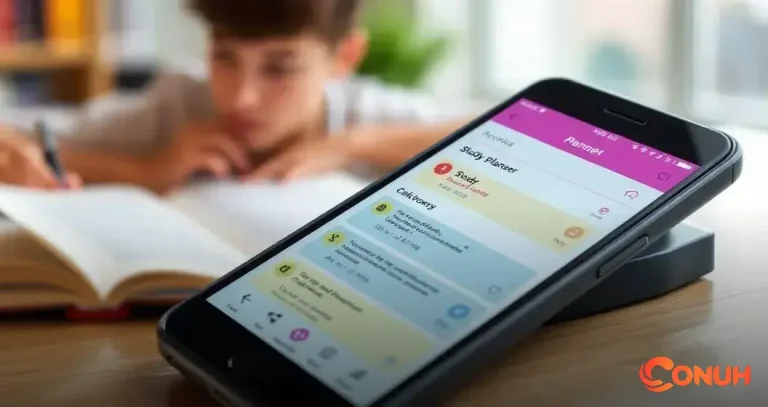ADVERTISEMENT
Study planner apps are changing how students approach their studies. By organising tasks and managing time effectively, these apps help learners stay focused and achieve their academic goals.
Easy to navigate, they provide personalised planning and reminders, ensuring that no deadlines are missed. The available features cater to different learning styles, enhancing overall productivity.
ADVERTISEMENT
These powerful tools can transform your studying habits. Keep reading to discover how to leverage study planner apps for academic success!
Top Study Planner Apps for Students
When it comes to study planner apps, students have an amazing variety of choices. Some of the top apps include Todoist, which helps you keep track of tasks with its user-friendly design. Another popular option is My Study Life, which allows you to plan and manage school assignments all in one place.
Each app offers unique features that make studying easier. For example, Google Keep lets you create notes and lists that sync across devices. Meanwhile, apps like Forest help motivate you by encouraging focus and reducing distractions while you study.
Choosing the right app depends on your study habits and preferences. It’s important to try a few different ones to see which feels best for you. With the right study planner app, you can boost your productivity and reach your academic goals!
Benefits of Using Study Planner Apps
Using study planner apps offers many benefits that can help students succeed. First, these apps help you stay organised by allowing you to create to-do lists and track assignments. This way, you won’t miss important deadlines, and you will always know what needs to be completed.
Another key benefit is improved time management. Study planner apps let you schedule study sessions and breaks, making it easier to balance work with rest. As a result, students can focus better and reduce stress during exam periods.
Lastly, study planner apps can increase motivation. Many apps include features such as reminders and rewards for completing tasks. These little boosts can keep you encouraged and engaged in your studies. By using a planner app, you have a powerful tool that supports your learning journey!
How to Choose the Right Study Planner App

Choosing the right study planner app can feel overwhelming, but it can be easy if you know what to look for. Start by deciding what features are most important to you. Some apps focus on task management, while others might offer scheduling tools or reminders. Make a list of what you need from an app to help you stay organised and productive.
Next, consider the app’s design and usability. A good study planner app should be easy to navigate and visually appealing. You want to spend your time studying, not figuring out how to use the app. Take a moment to explore different options and see which ones you find most comfortable to use.
Lastly, check for reviews and ratings. Hearing from other users can give you valuable insights into the app’s effectiveness. Look for apps that have positive feedback and a strong community. With the right study planner app, you can enhance your learning experience and reach your goals!
Features to Look for in Study Planner Apps
When looking for study planner apps, it’s important to think about the features that will help you most. One valuable feature is task organising. This allows you to create to-do lists and set priorities for your assignments. A clear visual layout can help you see what needs to be done at a glance.
Another essential feature is calendar integration. Many apps let you sync with your existing calendars, making it easier to keep track of deadlines and important dates. This way, you can ensure that all your tasks and events are in one place, reducing your chances of missing anything.
Finally, look for customisation options. The ability to personalise your app can make using it more enjoyable. Whether it is choosing themes, setting reminders, or adding notes, these options can enhance your user experience and help you stay motivated.
Tips for Maximising Study Planner Apps
To maximise your use of study planner apps, start by setting clear goals. Knowing what you want to achieve helps you use the app effectively. Whether it’s improving grades or preparing for exams, having specific targets keeps you focused and motivated.
Another helpful tip is to review and adjust your plans regularly. Life can change quickly, so make it a habit to check your schedule and goals. This way, you can make updates when needed and adapt to new challenges that arise during your studies.
Finally, take advantage of reminders and alerts. Use these features to stay on track with assignments and study times. By receiving alerts for upcoming tasks, you can ensure that nothing slips your mind, helping you to stay organised and committed to your study plan.
Integrating Study Planner Apps with Your Schedule

Integrating study planner apps with your schedule is key to being successful. Start by your app with any digital calendars you use, like Google Calendar. This connection helps you see all your tasks and deadlines in one place, making it easier to plan your study time around other commitments.
Another important step is to set aside specific study times. Look at your weekly schedule and find consistent blocks of time when you can focus on studying. Adding these blocks into your planner app can help you stay committed and develop a routine.
Lastly, be flexible with your study plans. Life can be unpredictable, so adjust your schedule as needed. If something comes up, reschedule your study sessions within the app. This way, you can keep your learning process on track, even when things change.
User Reviews of Popular Study Planner Apps
User reviews of popular study planner apps reveal a lot about their effectiveness. Many students love Todoist for its clean layout and ease of use. Users appreciate how simple it is to create lists and manage tasks, which helps them stay organised and focused.
Another app, My Study Life, gets high marks for its ability to manage classes and deadlines together. Students enjoy the fact that they can see their entire study schedule in one place. This feature allows them to plan efficiently and feel more in control of their studies.
On the flip side, some users find that some apps can have a steep learning curve. While they may offer fantastic features, not everyone finds them easy to navigate. It’s important to read user reviews to find an app that matches your needs and study style.
Comparing Study Planner Apps
Comparing study planner apps can help you find the one that suits your needs best. For instance, Todoist is known for its powerful task management features. It allows users to create and manage tasks easily, but it might be more suited for those who prefer a straightforward approach without many extra features.
On the other hand, My Study Life offers unique functionality for students. It combines class schedules, assignments, and exams in one place. This makes it an excellent choice for learners who want everything related to their studies in a single app.
Another app, Forest, promotes focus and productivity through a fun and engaging setup. Users plant a virtual tree that grows while they study. However, it may not have as many planning features as some others. Comparing these apps can help you balance between functionality and motivation to find the best fit for your study style.
Future Trends in Study Planner Apps

The future of study planner apps is bright, with exciting trends on the horizon. One major trend is the integration of artificial intelligence. AI can personalise study plans based on a student’s learning habits and progress, making apps more effective and user-friendly.
Another trend is increased collaboration features. Many students work together on projects, and apps will soon include tools that allow for seamless sharing of schedules and assignments. This collaborative approach makes studying more interactive and enjoyable.
Lastly, we can expect a rise in gamified learning. Study planner apps will use game-like elements to motivate users, such as rewards for completing tasks. This can engage students more and turn studying into a fun experience, encouraging them to stick to their plans.







